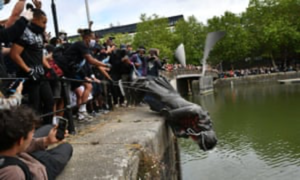
There has been considerable debate about the statue of Edward Colston being delivered to a watery grave in the Bristol Harbour recently. It was fascinating to look back at Colston’s history. His company transported more than 100,000 slaves from West Africa to the Caribbean and the Americas between 1672 and 1689, cramming them into ships to maximise profit.
The slaves, including women and children, were branded on the chest with the company’s initials, RAC. Unhygienic conditions, dehydration, dysentery and scurvy killed more than 20,000 during the crossings and their bodies were thrown overboard.
The Guardian commented:
Today is the first full day since 1895 on which the effigy of a mass murderer does not cast its shadow over Bristol’s city centre. Those who lament the dawning of this day, and who are appalled by what happened on Sunday, need to ask themselves some difficult questions. Do they honestly believe that Bristol was a better place yesterday because the figure of a slave trader stood at its centre? Are they genuinely unable – even now – to understand why those descended from Colston’s victims have always regarded his statue as an outrage and for decades pleaded for its removal?
If they do not confront such questions, they risk becoming lost in the same labyrinth of moral bewilderment in which some of Colston’s defenders became entrapped in 2017. That year Colston Hall, Bristol’s prime concert venue, and one of the many institutions named after the slave trader, announced that it was to change its name. In response, a number of otherwise reasonable decent people announced that they would be boycotting the hall. Think about that for a moment. Rational, educated, 21st-century people earnestly concluded that they were taking a moral stance by refusing to listen to music performed within the walls of a concert hall unless that venue was named after a man who bought, sold and killed human beings.
Now is not the time for those who for so long defended the indefensible to contort themselves into some new, supposedly moral stance, or play the victim. Their strategy of heel-dragging and obfuscation was predicated on one fundamental assumption: that what happened on Sunday would never happen. They were confident that black people and brown people who call Bristol their home would forever tolerate living under the shadow of a man who traded in human flesh, that the power to decide whether Colston stood or fell lay in their hands. They were wrong on every level. Whatever is said over the next few days, this was not an attack on history. This is history. It is one of those rare historic moments whose arrival means things can never go back to how they were.
Leave a Reply